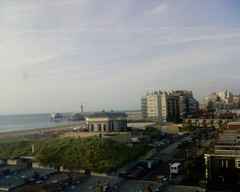This post has been brewing for a long time – but it’s about time I wrote this down. Last December I had the pleasure of meeting Robert Scoble twice. In Ireland and London. Both times he was surrounded by other people equally keen on grabbing his ear for a few minutes. Poor bloke seemed to spend all evening without a moment to himself!
When Robert came by our part of the table in Ireland, the discussion led to feed readers. Most people voiced their support for various products, but I had a different view. I don’t generally use an aggregator, so I said as much. ‘Why?’ asked the small group of people. I told them I prefer to read the site itself. I liked the designs of the sites and prefered to read articles on a full-blown HTML page, but struggled to give a clear reason.
Robert suggested this was a common view for advertisers (makes sense), but was quickly distracted by other people vying for his attention and went away.
That irritated me quite a bit. Not the response – it was my comment that irritated me. I couldn’t believe that I gave such a vague and pathetic reason, that was easy to dismiss and didn’t give much value to the conversation. The fact was, I don’t use aggregators and I hadn’t actually figured out why.
It actually took me a few months of playing with various aggregators; reading blogs day in, day out (as always) – this time with a view to actually figuring out what it is I did and didn’t like about them. Another few months to get around to actually writing this….
Turns out, the main reason I don’t use aggregators is – ironically – because they play such an important and regular part of my day if I do use them. The trouble is that in applications used so frequently, even the slightest kink becomes a regular irritation.
I’ve yet to find an aggregator I actually like and don’t get annoyed with. FeedDemon kept demanding a NewsGator login (which I didn’t want to give), and I couldn’t disable the message without logging in.
Outlook 2007‘s feed reader seemed to miss half of all new posts, and refused to parse some feeds at all.
The reader in Flock was good for a while, but I kept getting ‘Script is busy’ error messages, and it wouldn’t let me customise the refresh time (I’ve since found out how to do that).
I’m currently using FeedReader. It’s okay, but can have a very slow interface at times. That said, it’s growing on me.
Arguably, I’ve been using some products in beta so should expect to be burned at times. I might go back and try more stable versions, but am reluctant to go through the whole installation/transfer OPML/try out cycle again.
I’m quite keen to find a ‘river of news‘ reader. I tend to read feeds quite regularly throughout the day, so it’s easier for me to see the latest couple of new posts each time, rather than click through individual updated feeds.
I’m also keen on finding a reader that lets me ‘mark all as read’ (for both a particular feed, and across the lot). Most should already do this, but some can be suprisingly unresponsive and slow. Remember that, given my point earlier about using aggregators all the time, the program should respond immediately – and yes, my computer is quite fast with a lot of memory and very little in the background. Other programs blaze along.
Dunno – I’m probably being very fussy here, but this – I believe – more accurately represents why I don’t use aggregators (for long).
Perhaps I’d be more driven to using one (and would ‘get over’ any issues) if I had more feeds to read. At the moment I have perhaps 15 or so; if I had 300+ it would be an issue. I can remember each URL I regularly visit, so it’s not a problem to switch off the aggregator and just type each URL into Flock.
Finally, despite being a generally impatient user, I would be quite interested to give it all another go. If you have a favourite reader you think is quick off the mark, reasonably uncomplicated and has a ‘river of news’ view please let me know. In return I’ll make more of an effort to document what I do and don’t like about each program.









